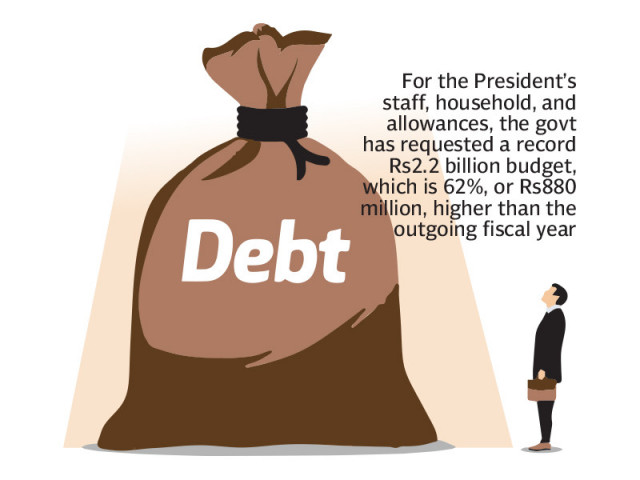Govt seeks Rs34.6tr borrowing
Allocations for state organs surge by up to 63% despite dire fiscal conditions

The government on Tuesday sought the National Assembly (NA)’s approval for Rs34.6 trillion in borrowing next year to meet budget needs for debt servicing and Pakistan’s constitutional organs, which have received up to a 63% increase in their allocations despite miserable economic conditions.
Finance Minister Muhammad Aurangzeb laid before the NA a compulsory expenditure bill of Rs34.6 trillion to meet the expenses of debt servicing and the requirements of the president of Pakistan, Supreme Court of Pakistan, NA, Senate, and other state organs.
The details showed that, despite unprecedented economic conditions, all these state organs have received budget increases ranging from 22% to 63% higher than this fiscal year. Under the constitution, these expenses are considered charged expenditures, which the NA does not have the right to vote on. The details show that despite the country’s difficult economic times, the government is taxing everything from infant milk to cars to raise revenues.
Around Rs710 billion has been sought to meet the obligatory expenditures of the NA, Senate, Election Commission of Pakistan, Supreme Court of Pakistan, president of Pakistan, Islamabad High Court, Federal Tax Ombudsman, Pakistan Post Office, Federal Ombudsman Secretariat for Protection against Harassment of Women, and the Foreign Office.
An amount of Rs33.8 trillion has been sought for Pakistan’s debt repayment requirements and interest costs, according to a summary of the spending bill presented by the government before the NA, seeking its endorsement.
The financing needs for repaying maturing debt, interest costs, and funding the next fiscal year’s budget deficit have increased at a time when the currency is under stress and interest rates are at a record high of 20.5%.
The Pakistani government does not repay principal loans from its budget but instead contracts more debt to repay maturing loans. This is also a reason why debt-related expenditures are significantly higher compared to the Rs18.9 trillion size of next fiscal year’s budget.
The amount of Rs33.8 trillion sought for the repayment of principal loans and debt servicing is lower by Rs6.8 trillion, or 17%, compared to the original budget approved for such expenses in June last year, according to the documents. The lower needs are because of the finance ministry’s decision to borrow in longer-tenor instruments. But there is still an increase in the cost of interest payments.
Except for the Rs9.775 trillion cost of interest on debt, which will be part of the federal budget, the rest of the amount will not be booked in the budget and will be directly borrowed from domestic and foreign markets to repay loans obtained in the past by successive governments.
Interest payments on domestic and foreign loans will consume roughly 52% of the proposed budget of Rs18.9 trillion for the next fiscal year. Compared to the original borrowing plan of Rs28.9 trillion for the outgoing fiscal year, the government has sought the assembly’s endorsement for Rs19.1 trillion to repay maturing domestic debt in the next fiscal year. This amount is lower by Rs9.8 trillion, or 34%, compared to the original allocation for this fiscal year.
The government has also requested Rs8.74 trillion for domestic debt servicing, which is 36%, or Rs2.3 trillion, higher than the outgoing fiscal year. The increase in the key interest rate is a major cause behind the surge in debt servicing costs, in addition to the ballooning budget deficit.
To repay foreign loans, the government has sought a record Rs5 trillion for the new fiscal year, which will be obtained from foreign lenders. The need for foreign loan repayment is up by 14%, or Rs600 billion.
Pakistan’s major debt sustainability indicators have been deteriorating, and the coalition government has not taken measures to cut its expenditures. Instead, it is putting more burdens on the people in the shape of higher taxes to finance these expenditures. The government has requested an additional Rs1.04 trillion to pay interest on foreign loans, which is higher by Rs166 billion, or 19%. It has asked for Rs29.5 billion from the NA to repay short-term foreign loans, which is down by 37%, or Rs17.5 billion.
There has also been a significant increase in the expenses of the NA, Senate, and president of Pakistan. For the staff, household, and allowances of the president, the government has requested a record Rs2.2 billion budget, which is 62%, or Rs880 million, higher than the outgoing fiscal year.
The President’s Office has not implemented any austerity measures, and the nation will pay the cost in the form of higher prices for fuel, milk, electricity, and reduced home take salaries. Both the NA and Senate will receive increases in their allocations compared to the original budget for the current year. The government has requested a Rs7.3 billion budget for the NA, up by Rs2.3 billion, or 46%.
The Senate of Pakistan will receive a record Rs5.2 billion budget, also higher by Rs1.9 billion, or 58%, over this year.
It seems that the country’s elite ruling class does not care about the deteriorating economic conditions, which will keep Pakistan under the thumb of the International Monetary Fund (IMF) for years to come.
The government has requested Rs4.4 billion for charged expenditures of the Supreme Court of Pakistan, which is higher by Rs800 million, or 22%. The Islamabad High Court will receive Rs1.87 billion, higher by Rs334 million, or 21%.
The Election Commission of Pakistan will get Rs9.6 billion in the next fiscal year. The Wafaqi Mohtasib will receive Rs1.5 billion. An amount of Rs430.4 million has been given to the Federal Tax Ombudsman.



















COMMENTS
Comments are moderated and generally will be posted if they are on-topic and not abusive.
For more information, please see our Comments FAQ